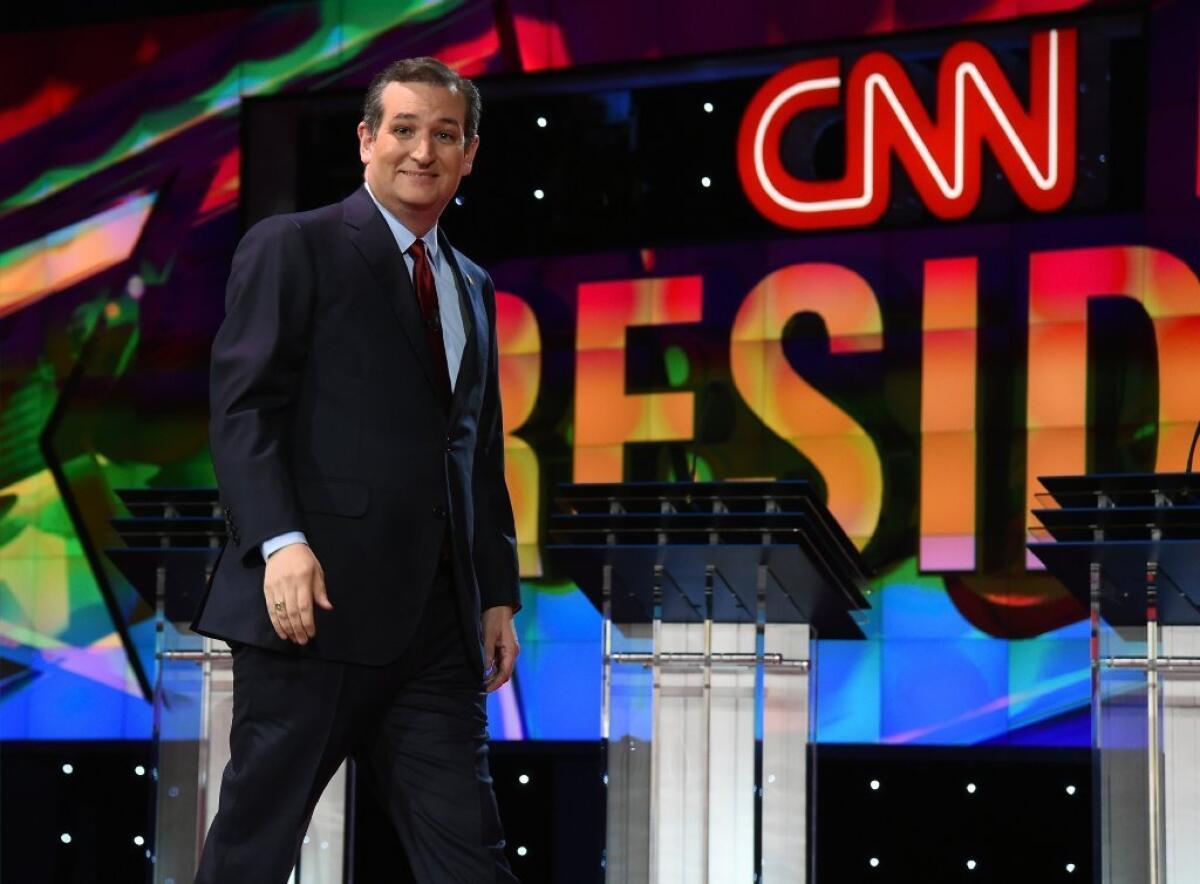Opinion: Not much love for the ‘freedom agenda’ at GOP debate

Sen. Ted Cruz is introduced at Tuesday’s Republican presidential debate in Las Vegas.
- Share via
Amid the insults and evasions of Tuesday night’s Republican presidential debate, there was a relatively substantial discussion of foreign policy that must have been tough viewing for neoconservatives who believe the U.S. should promote democracy abroad.
The neoconservatives were influential in the George W. Bush administration, particularly in justifying the 2001 invasion of Iraq that ousted Saddam Hussein. But Bush himself was a late convert to the “freedom agenda.” Running in 2000, Bush disdained “nation-building.”
Here’s what he said in a debate with Democratic nominee Al Gore about U.S. involvement in Somalia:
“Started off as a humanitarian mission and it changed into a nation-building mission, and that’s where the mission went wrong .... And so I don’t think our troops ought to be used for what’s called nation-building. I think our troops ought to be used to fight and win war.”
In the same debate, Bush said: “I think the United States must be humble and must be proud and confident of our values, but humble in how we treat nations that are figuring out how to chart their own course.”
But after the 2003 invasion of Iraq, Bush sang a different tune. In his second inaugural address in 2005, he said: “We are led, by events and common sense, to one conclusion: The survival of liberty in our land increasingly depends on the success of liberty in other lands. The best hope for peace in our world is the expansion of freedom in all the world.”
Join the conversation on Facebook >>
Flash forward to Tuesday night in Las Vegas.
Rand Paul, the libertarian in the race, dismissed what Bush called the “freedom agenda” and blamed a policy of “regime change” for chaos in the Middle East.
“Regime change hasn’t won.” Paul said. “Toppling secular dictators in the Middle East has only led to chaos and the rise of radical Islam.” Later Paul specifically suggested it was a mistake to try to force out Syrian President Bashar Assad.
Sen. Ted Cruz said that “far too often President Obama and Hillary Clinton — and, unfortunately, more than a few Republicans — have gotten distracted from the central focus of keeping this country safe.” Cruz pointed to the intervention that led to the ouster of Libya’s Moammar Kadafi, which he said was motivated by Obama and Clinton’s desire to promote democracy.
Cruz then cited two other deactivators whose ouster or pending ouster had created openings for Islamic extremists — Hosni Mubarak in Egypt and Assad in Syria. The answer to Islamic State, Cruz said, wasn’t to act as “a Woodrow Wilson democracy promoter.”
TRAIL GUIDE: All the latest news on the 2016 presidential campaign >>
Then there was front-runner Donald Trump, who offered this memorable description of the unintended consequences of the freedom agenda:
“In my opinion, we’ve spent $4 trillion trying to topple various people that frankly, if they were there and if we could’ve spent that $4 trillion in the United States to fix our roads, our bridges, and all of the other problems; our airports and all of the other problems we’ve had, we would’ve been a lot better off.”
Sen. Marco Rubio defended the ouster of Kadafi — “the man that killed those Americans over Lockerbie, Scotland” — and said he likewise wouldn’t shed a tear over the downfall of Assad. Rubio praised the ouster of Saddam Hussein, which, he said, persuaded Kadafi to reverse his nuclear program.
But these were defenses rooted in national security and U.S. self-interest — not in a Wilsonian “freedom agenda.”
Not everyone who argues for that agenda does so totally out of altruism. Some neoconservatives believe that by promoting democracy in the Middle East the U.S. can ally itself with the democratic forces that inevitably will arise to challenge authoritarian regimes. In the long run, according to this school of thought, the best insurance against movements such as Islamic State is democratization.
But that wasn’t a popular view on the debate stage in Las Vegas.
Follow Michael McGough on Twitter @MichaelMcGough3
MORE ON GOP DEBATE
Ted Cruz wants to ‘carpet bomb’ Islamic State, but with some limits
Senate panel not checking whether Ted Cruz released classified info in debate
‘You can’t insult your way to the presidency’ and other times Bush attacked Trump
More to Read
A cure for the common opinion
Get thought-provoking perspectives with our weekly newsletter.
You may occasionally receive promotional content from the Los Angeles Times.










